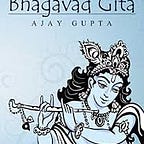Which Is the Best Life-Changing Book You Have Read So Far?
How Does the Book ‘Word of God Bhagavad Gita’ Explain the Art of Living And Dying?
Bhagavad Gita contains the greatest secrets for the human beings on all aspects of living and dying. The knowledge was directly revealed by lord Krishna himself 5100 years ago and carries the blessings of God Krishna.
The great scientist Albert Einstein who made great scientific discoveries said, “When I read the Bhagavad Gita and reflect on how God created the Universe, everything else seems so superfluous. I have made Bhagavad Gita as the main source of my inspiration and guide for the purpose of scientific investigations and formation of my theories.”
The lofty Scripture of Bhagavad Gita is so sublime, that it’s teaching has been acknowledged all over the world as the greatest scripture.
It has been translated into all the major languages of the world and it is revered as the complete ‘Book of Wisdom in spirituality.
There are a total of 700 verses in the Bhagavad Gita.
Just a few of the verses are as given below.
न जायते म्रियते वा कदाचि न्नायं भूत्वा भविता वा न भूयः।
अजो नित्यः शाश्वतोऽयं पुराणो न हन्यते हन्यमाने शरीरे।। (2:20)
The soul has neither birth nor death. Coming into existence at birth and ceasing to exist at death, both do not take place for the soul. The soul is unborn, deathless, eternal, changeless, and ancient from the beginning. The soul is not destroyed when the body dies. (Book: Word of God Bhagavad Gita: Chapter 2 verse 20: Amazon)
वेदाविनाशिनं नित्यं य एनमजमव्ययम्।
कथं स पुरुषः पार्थ कं घातयति हन्ति कम्।। (2:21)
O Partha Arjuna! Having realized that the soul is unborn, deathless, eternal and imperishable, and then who kills whom? (Book: ‘Word of God Bhagavad Gita’: Chapter 2 verse 21)
वासांसि जीर्णानि यथा विहाय नवानि गृह्णाति नरोऽपराणि।
तथा शरीराणि विहाय जीर्णा न्यन्यानि संयाति नवानि देही।। (2:22)
Just as human beings discard worn-out clothes and wear new ones; similarly the embodied soul upon leaving the physical body, enters into others that are new. (Book: Word of God Bhagavad Gita: Chapter 2 verse 22)
नैनं छिन्दन्ति शस्त्राणि नैनं दहति पावकः।
न चैनं क्लेदयन्त्यापो न शोषयति मारुतः।। (2:23)
Weapons cannot cut the soul, fire cannot burn it, water cannot wet the soul, nor can wind dry the soul. (Book: Word of God Bhagavad Gita: Chapter 2 verse 23)
The meaning of above verse is hidden in the form of a Bija mantra. The verse says that no one can fathom the mystery of the soul. There is no possibility of any scientific discovery on the invisible aspect of the soul as the substratum of all life. The soul is not a matter, and cannot be seen.
The nearest one can explain the soul is in comparison with ‘Akasha’ or space, which is the fifth element of nature with no physical attributes, and is present both within and without; and hence there can be no scientific instruments to measure space, as it is empty.
God or the Supreme Spirit is both near and far; and this metaphor is used to explain the mystery of God. Space or ‘Akasha’ can exist both within and outside. No one can fathom the mystery of the soul, and it is so subtle that it cannot be known or seen directly. It can best be explained by means of a story or a parable.
A disciple asked an enlightened master, “How does one seek union with God?”
The master replied, “The harder you seek, the more distance you create between the Spirit of God, and you.”
The disciple asked, “So what does one do about the distance? Is the union with God far or near?”
The master said, “Understand that it is not there.”
The disciple says, “Does that mean that God and I are one?”
The master replied, “Not one. Not two.”
The disciple says, “How is that possible?”
The master said, “The sun and its light; the ocean and its waves; the singer and his song. Not one…. Not two.”
Think and meditate over it.
जातस्य हि ध्रुवो मृत्युर्ध्रुवं जन्म मृतस्य च।
तस्मादपरिहार्येऽर्थे न त्वं शोचितुमर्हसि।। (2:27)
One who is born is sure to die one day, and all those who die are certain to be born again. One should not therefore, grieve over this inevitable and ultimate truth of life. (Book: Word of God Bhagavad Gita: Chapter 2 verse 27)
Sri Krishna says in Sanskrit, “ Jatasya: — of the born: — hi: — for: — dhruvah: — certain: — mrityuh: — death: — dhruvam: — certain: — janma: — birth: — mritasya: — of the dead: — cha: — and: — tasmat: — therefore: — apariharye arthe: — over this inevitable fact: — na…tvam…shochitum: — you should not grieve.”
यस्त्वात्मरतिरेव स्यादात्मतृप्तश्च मानवः।
आत्मन्येव च सन्तुष्टस्तस्य कार्यं न विद्यते।। (3:17)
But a person who is joyous in one’s Self-soul; satisfied in one’s own self, and is centered in his own Self-soul, for such a person there is no obligatory duty to perform. (Book: Word of God Bhagavad Gita: Chapter 3 verse 17)
What does Bhagavad Gita say on death?
O son of Kunti-Arjuna! Whatever last thoughts occupy the mind of a dying person while leaving the physical body just before death, to that alone he or she attains, being ever absorbed in the last thoughts thereof. (8:6)
यं यं वापि स्मरन्भावं त्यजत्यन्ते कलेवरम्।
तं तमेवैति कौन्तेय सदा तद्भावभावितः।। (8:6)
Ajay Gupta is the author of the book ‘Word of God Bhagavad Gita’: — Word of God Bhagavad Gita by Ajay Gupta: Gmail: Ajay Gupta: Amazon.in: Kindle Store
